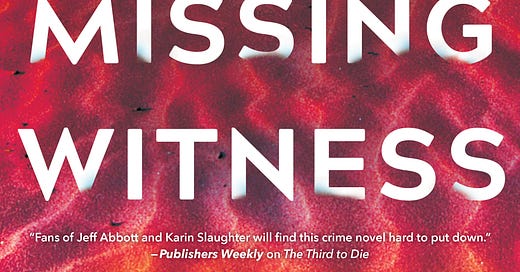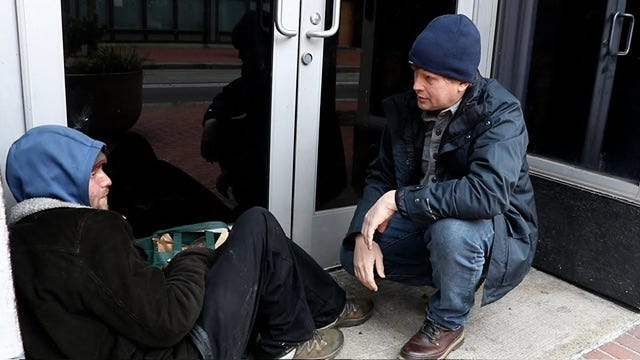Stories come from everywhere. Years ago, shortly after I signed my first publishing contract, I feared I’d never have another idea, that I was “one and done.” Then I got that idea … and feared that was it.
(You can read about my first book and the road bumps along the way in the article below.)
It took several years before I was confident that it wouldn’t be ideas I lacked, but the time to write the stories I wanted. Stories come from everywhere — from reading about crime, current events, human interest stories; from observing people wherever I go and talking to both friends and strangers. You never know when a nugget of an idea three years ago will ignite with the right spark today to help me write a compelling story.
Several years ago — well, more than five years because I was still living in California at the time — I read two articles about the homeless crisis that stuck with me. The first was a long essay about how to fix the homeless problem focusing on each sub-set of people. For example, those who are temporarily homeless (lost their house, their job, an abused spouse with no family, a mom with kids, etc) are the easiest to place. They should be helped first. Then the author talked about other groups — veterans with PTSD or substance abuse problems; the chronically homeless; the drug addicts; those with untreated mental illness; and more. He had solutions to help each group that focused on empowering them, not enabling the behavior that led them down this destructive path. The author’s point was that homelessness is a humanitarian crisis and it’s neither moral nor just to allow people to live on the streets where they often become victims of crime, not to mention the livability issue for people in those neighborhoods. No one wants to leave their home or work and confront used needles or human feces on the sidewalk or in the park where their kids play.
The second article was about how housing for the homeless was funded. I was appalled that a study in Los Angeles reported that each unit cost from $250,000 to over one million dollars. How could we as a society help people with that kind of price tag? And how could we help a drug addict by giving him a house without requiring that he get sober, go to job training, get counseling, and learn to become self-sufficient? Without the tools to succeed and support, many people will find themselves back where they started. But mostly, I was stunned that the billions of dollars state and federal governments spend each year to solve the homeless crisis has only made the crisis worse. As more money has been spent on the problem, more people are living on the streets.
But I write thrillers. I don’t write social commentary, and I don’t like to incorporate any political views into my work. I’m sure such views are there — the Quinn & Costa series is a police procedural. I’m pro-law enforcement. I have family in law enforcement. While I acknowledge there are bad cops, I accept that most are good men and women facing increasingly hostile communities and that bothers me, so such feelings might show on the page. But for the most part, I leave politics for discussions with friends over a good bottle of wine.
Fast forward a couple years and I started researching the fifth Quinn & Costa book, The Missing Witness. I thought the story would be simple: Kara Quinn returns to Los Angeles to testify against the human trafficker she’d arrested the year before in the case that sidelined her career with LAPD and put her on the FBI’s mobile response team. Matt Costa and Michael Harris join her — Matt to investigate an LA-FBI agent who may have leaked information that got Kara’s partner killed, and Michael to protect Kara since the trafficker put a price on her head.
The story was anything but simple. I had a lot of questions, such as how did David Chen get away with trafficking Chinese women and forcing them to work in his factory for years? Where did these women live? How did Kara get inside the operation in the first place? Who knew of Chen’s operation and how could he succeed for so long? The more I researched, the more I realized that Chen had to have government employees on his payroll — inspectors, politicians, cops.
I still wasn’t exactly certain how the story was going to come together, but early on (this isn’t a spoiler, it’s in the cover copy!) Chen is killed in front of the courthouse. I had to stop writing because I didn’t know why he was killed or who killed him.
This is when I really dug into government operations, interviewed friends who worked in local governments, and then remembered the previous articles I’d read about how the government funds homeless housing projects. Bingo. This gave me a motive for his murder.
There is no honor among thieves.
I spent a full week reading articles and interviewing experts, including investigative journalist Katy Grimes who helped me understand how non-profits are funded, and social worker Kevin Dahlgren who has worked with the homeless for more than thirty years. Kevin helped me see the homeless as people stuck in a cycle partly caused by the government programs that should be helping them.
Aside: Kevin has a Substack “Truth on the Streets” if you’re interested in the homeless crisis and what’s happening on the street and behind the scenes. You can read his articles here:
As the story started to form, I initially planned to have Kara live among the homeless to protect herself from a threat while also searching for answers about David Chen’s murder. But almost immediately, I knew it wouldn’t work. After talking to Kevin about who is living on the street and how they are being helped (or not helped) by government programs, I felt the story would be more powerful if I could parallel the graft and corruption in City Hall with the plight of one young woman (a whistleblower) and her homeless mother who she has been trying to help for years.
I write fiction. However, there is a lot of truth in this book that has had me thinking about the homeless crisis and how government and non-profits have failed people. I’m not a pollyanna about the situation — the majority of the homeless have a history of substance abuse and/or untreated mental illness. They need help to get out of the situation they are in to empower them to take control of their lives. But so many of the government programs today do nothing to actually help people get off the streets. There’s little consistent one-on-one outreach. There are a lot of broken promises and distrust. There is actually a law in California that prevents government money from going to drug treatment facilities that require sobriety. There are people who advocate letting people stay homeless because they want to be homeless and who are we to judge them?
There is no one-size-fits-all solution to this humanitarian crisis, but it is neither just nor moral to allow human beings to live in filth, to slowly kill themselves through chronic drug use, or to let the mentally ill continue to suffer. The fentanyl crisis has made the homeless crisis worse: fentanyl is a highly addictive, very cheap drug that is killing people. Government has spent billions of dollars to fix the problem and it has only gotten worse. The Missing Witness is one story that might explain why.
Don’t worry — the book is not about the homeless. While that is the “story behind the story” it’s simply the backbone on which the crime is built. The Missing Witness is about murder, corruption, and people who believe they are above the law. It’s about a whistleblower who wants to do the right thing and gets caught up in a conspiracy that puts her life in danger. Kara Quinn really shines as she hurdles obstacle after obstacle — including those put up by her friends in LAPD — as she tries to solve not only Chen’s murder, but another murder that hits much closer to home.
Matt Costa and Michael Harris are major characters in this story from the mobile response team. I also introduce a new FBI Agent, Sloane Wagner, who has a small role in this book but I hope to write about her in the future. And we meet the people who were important to Kara in LAPD — and learn that someone is keeping secrets.
I’ve been pleased with the early reviews from both the industry and early readers:
Publishers Weekly called The Missing Witness an “Action-packed fifth adventure” and Booklist said, “A complex thriller … will likely satisfy Quinn and Costa’s loyal followers.” Readers at Goodreads have said, “A fast paced tale”; “I couldn’t put it down”; “Very highly recommended.”
I hope you love The Missing Witness which goes on sale Tuesday, January 23.
Visit my webpage for preorder links, including the option to buy a signed book through The Poisoned Pen in Arizona.
Thanks for being a loyal reader. I truly appreciate you.
Allison






